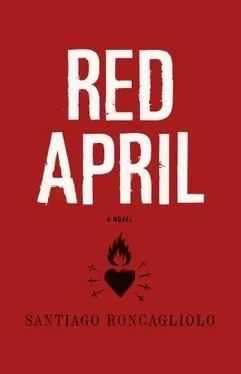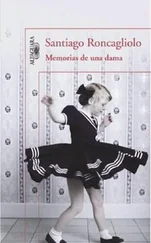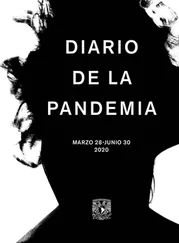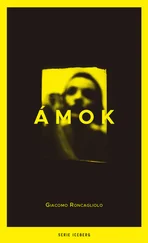In the restaurant, for a change, she was alone. The prosecutor sat in his usual place, but Edith did not seem to be in a very good mood.
“Where have you been eating lunch?” she said. “You don't come here anymore.”
“I just have a lot of work. But that does not mean I don't want to.”
“Sure, now it seems you're too important to come here. We have stewed tripe. Do you want some?” she asked without enthusiasm, as if he were just another customer in a crowded restaurant. He thought the best thing would be to agree and improve the mood of his hostess. Fifteen minutes later she put the plate down on the table and went to one side, her back turned, to wash glasses. An American sitcom was on television. Two blond girls fought nonsensically over a tall, good-looking boy who did not know which one to choose.
“I even bought a dress for the parties you invited me to,” Edith said.
With a gesture she indicated one of the chairs, where a pink lace dress was hanging, covered with embroidered arabesques and decorations. She had kept it there for days to show to the prosecutor when he came in. By now it even smelled of the kitchen. The prosecutor thought it was pretty. And he felt guilty for having made her spend her money. He was not hungry. His eyes moved back and forth between his plate and the young woman, and he did not know where to rest them. He wanted to say that he was very busy, that it was not always possible for him to have lunch, given all his meetings, dinners, and work-related travel. Finally he said:
“I'm not important.”
“What did you say?” She stopped and turned around. Her straight hair hung loose over her shoulders, her neck, her forehead.
“I'm not … important at all, Edith. I don't have a car. And I won't have one. They won't invite me to the parties for high-placed officials. In fact, I don't think I'm very good at those parties. When I try to speak no one listens. Perhaps it's because I never understand what's going on at parties … I don't think I even understand what's going on in this city or this country. Recently I've thought I don't understand anything about anything. And not understanding frightens me.”
It embarrassed him to tell a woman that he was afraid. But the words had left his mouth automatically, like a burst of bullets from a Star machine gun in a helicopter flying overhead. He had not been able to control them. That, perhaps, was what frightened him most. Knowing there was something he could not control, something inside him, terrified him more than what he could not control on the outside, what depended on whispers in bathrooms, on galas, on offices decorated with flags, on parades. He had lowered his eyes to his untouched plate, so that only the scent of Edith's cheap shampoo made him aware that she had approached him and almost touched him.
“Nobody understands anything here,” she said. “But nobody admits it, either. You have to be brave to say that.”
“I'm a coward, Edith. I always have been.”
Suddenly the prosecutor felt warmth on his hand, an agreeable, protective feeling he had not experienced for a long time. It took him a few seconds to move his eyes away from the tripe and discover it was Edith's hand that had interlaced fingers with his. They remained silent for several minutes while the tourists made more and more noise as they searched for bars where they could spend the evening. Two Limenians came into the restaurant.
“Do you sell beer?”
“We're closing,” she replied.
The prosecutor wanted to tell her not to stop working because of him. The tourist business would be very good for the restaurant, and in any event, his problem was not that serious. In fact, he was not even sure what “his problem” was, and it was not worthwhile for her to worry so much about it. But the pressure of those slim fingers on his and the odor of tripe coming from that small woman seemed to have sealed his lips. When the tourists left, Edith locked the door, put the prosecutor's plate in the refrigerator, and went out with him. They walked in silence to the prosecutor's house. Chacaltana remembered what it was like to walk down the street with a woman beside him, the feeling of four legs walking in rhythm, not like guards marching but with a free step, calm and slow. From time to time they smiled for no reason.
“During Holy Week I'll work at the restaurant in the mornings too,” she said. “There'll be lots of tourists. You can come for breakfast if you want. Because you eat in the mornings, don't you?”
“Call me Félix.”
“I have a small farm with my cousins in Huanta. I work here now because the harvest is over. I'll come back next year.”
“Every year.”
“Every year. Time is like that here. Everything is repeated over and over again. Planting, harvesting …”
“Maybe life can change. When somebody disappears, nothing is the same anymore. When somebody falls in love, nothing is the same either. Some things are forever.”
“I hope so.”
When they were in his house, the prosecutor offered her a mate . They sat in the living room to talk. The prosecutor wondered if her impulsive visit to the house was a sign she would end up in his bed. Then he realized he did not really want to go to bed with Edith, at least not that night. That night he felt like talking to her, being lulled by her voice and her patience, perhaps embracing her. That was all. At least, that was what he thought.
“How did your parents die?”
“It was the terrorists,” she replied.
“It was a horrible time, wasn't it?”
“I don't want to talk about it.”
Nobody wanted to talk about it. Not the military, or the police, or civilians. The memory of the war had been buried along with its dead. The prosecutor thought the memory of the eighties was like the silent earth in cemeteries. The only thing everyone shares, the only thing no one talks about.
“Do you go to visit your parents often?”
“I go all the time. I feel alone without them. I've always felt alone.”
“I still see my mother.”
She smiled without understanding. He decided to show her what he had never shown anyone. Perhaps she would understand. He took her hand and led her to the back room. When he opened the door, her eyes lit up. The interior looked like a room from twenty years ago, the room of a señora with its mirror, its furniture of old wood, even the old-fashioned creams and colognes used by grandmothers. She walked around the room, touching everything gently, as if acknowledging the presence of his mother through touch.
“This was her room?”
“My house burned down when I was a boy. When I came back, I reconstructed her bedroom here just as I remembered it. It was pretty, wasn't it?”
She did not answer. He asked himself if she would understand. He had never shown the bedroom to anyone. Perhaps it was a mistake to let her see it. It was like undressing in public.
“She … is my strongest memory of Ayacucho,” he said.
“It's as if she were still alive.”
“She is … in a way.”
Edith looked at the photographs.
“And your father?”
Prosecutor Chacaltana shook his head. He smiled as she admired the fabric of the sheets and the aroma of damp wood.
“It's important to remember,” she said. “They remember us.”
A warm breath emanated from the interior of the bedroom. The prosecutor knew that his mother liked this girl and welcomed her into her embrace, as if she were a new daughter. He approached the bed and kissed her. It was a gentle kiss, barely a brush of their lips. She did not resist. He repeated the gesture slowly, trying to grow accustomed again to the touch of someone else's skin. He took her hand and led her to the living room. It seemed disrespectful to kiss her in the bedroom. They lay down on the sofa in the living room and continued kissing gently, exploring each other. After a few minutes, he slipped his hand under Edith's blouse. She let him do so, embracing him. He lifted her blouse and lowered his head. He kissed her navel, her belly, and moved up until he was licking her breasts. They were small breasts, just like her, barely rising from her recumbent body. He felt a remote heat that had almost been banished from his memory. He continued moving up to her throat. Now she let him do what he liked without responding. The prosecutor noticed that he had an erection. He tried to move his hand below her waist. She stopped him firmly. Edith's eyes were half-closed but attentive. Perspiration beaded in the space between her upper lip and her nose, like a liquid mustache. She was trembling.
Читать дальше












